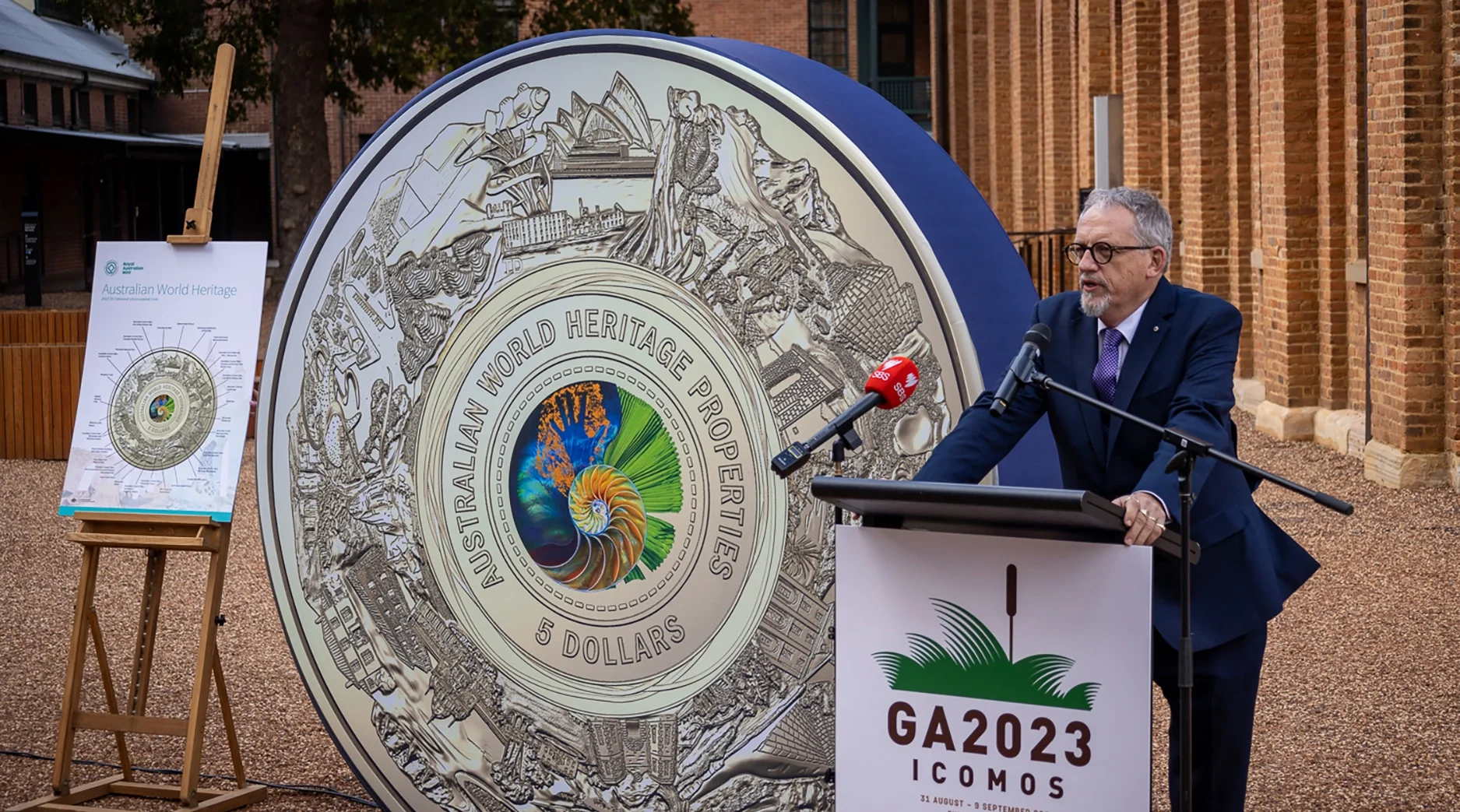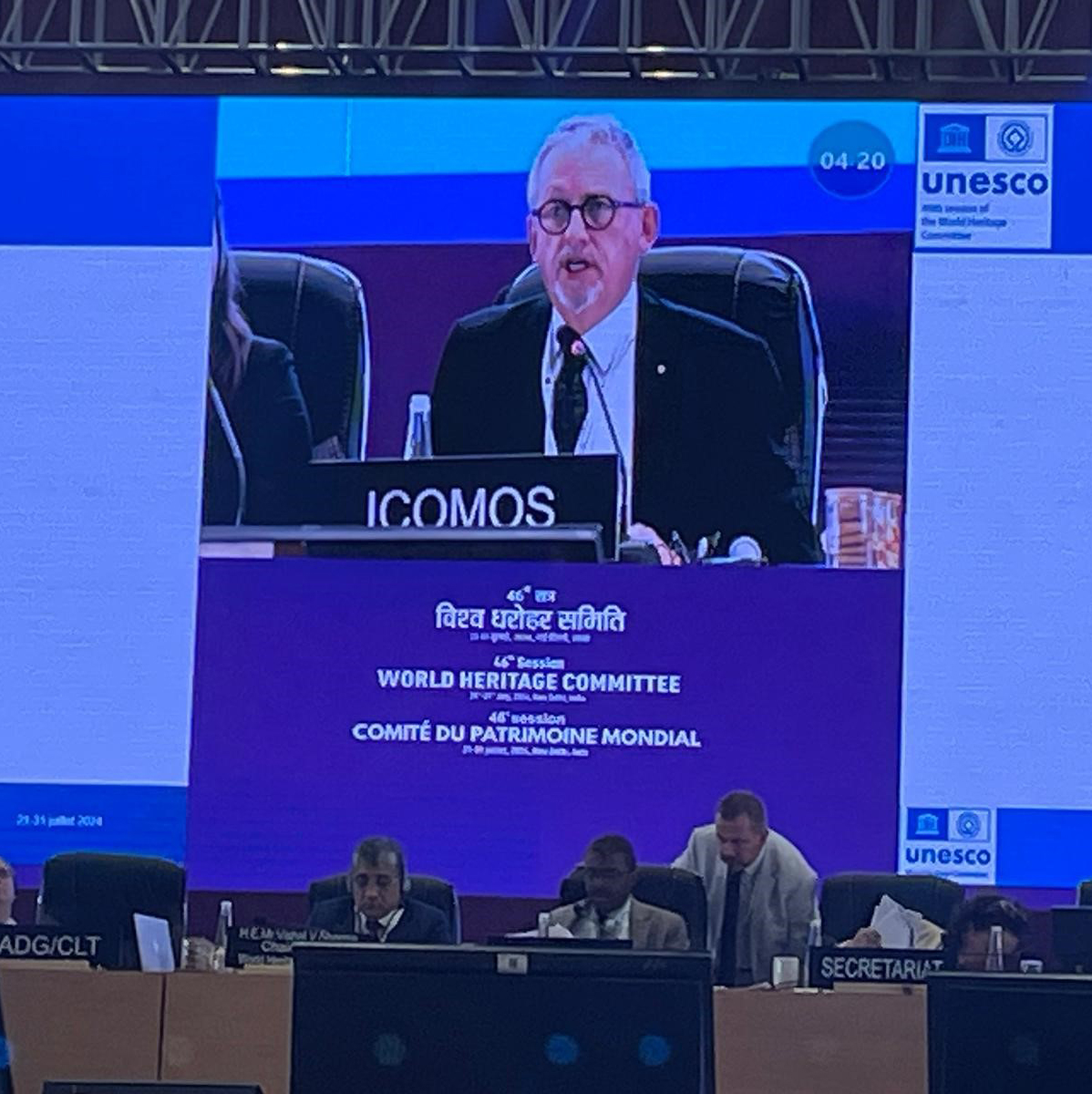
Interview with Professor Richard Mackay AM
Prof Richard Mackay AM at the launch of the Australian World Heritage coin in 2023. Photo: Kylie Christian.
Co-founder of GML Heritage, Professor Richard Mackay AM, was recently appointed as a Member of the Australian Heritage Council. We spoke to Richard about the challenges facing Australia's heritage sector and his aspirations for his term on the Council.
What are your aspirations for your term on the Australian Heritage Council, and how do you hope to influence the direction of heritage conservation in Australia?
I am honoured to have been appointed to the Australian Heritage Council, by Minister Plibersek, along with a remarkable group of eminent Australians, with deep knowledge and experience. Building on the work of previous Councils, I hope that during my term we will help make Australia’s National Heritage List more representative of our shared heritage, and more accessible and relevant to the Australian community. I see significant opportunities both to add to the diversity of represented places and to engage better with the communities who cherish and care for them.
The Australian Government has an important role in leading and co-ordinating heritage conservation and management. The Australian Heritage Council, as the national Government’s expert adviser, can directly support that important role. I hope to apply some of the knowledge and thinking I have gained in four decades of professional practice, particularly in Australia through GML, and internationally as an ICOMOS World Heritage adviser, towards improving our national heritage system, and extending Australia’s well-earned reputation for exemplary heritage conservation and management.
In your view, what are the most pressing challenges currently facing Australia’s heritage sector? Will you be looking back at the State of the Environment reports you prepared to inform your approach?
Yes; I do bring a legacy of heritage reporting and policy development and the national and international level to my new role. As to threats, well; climate change must be the existential issue of our generation and represents a major threat to intergenerational transmission of the natural and cultural values that underpin our heritage; a threat that was strongly pressed through my work on the 2011 and 2016 Commonwealth State of the Environment reports.
Population pressure is another driver, with the concurrent opposite effects of urban intensification and rural de-population perversely creating pressure for new development yet denuding some communities of essential resources. The current ‘housing crisis’ has particularly focused attention on heritage items and urban conservation areas, yet well managed, our heritage places offer wonderful opportunities for adaptation and new use. In Sydney the Walsh Bay Arts Precinct and White Bay Power Station illustrate what a clever ‘values-based’ approach to heritage, (as advocated in the Burra Charter) can achieve, albeit in a State-base statutory context. I’d like to think that the Australian Heritage Council might champion innovative approaches that give our heritage greater community usefulness and relevance.
How do you see the role of the Australian Heritage Council evolving in the coming years?
The Australian Heritage Council has been particularly focused on assessment of places for inclusion on Australia’s National Heritage List, the management of the Commonwealth Heritage List and oversight of the preparation of heritage management plans for these places, and sometimes providing advice about proposals that affect National Heritage places. I would like to see the Council extend its role and influence, consistent with our legislation, and to provide more high-level thinking and impactful strategic advice on heritage projects and processes. In particular, I am very interested in exploring the scope and story of our National Heritage List and encouraging a more inclusive and consultative system for nomination of Australian properties to the World Heritage List.
Can you share any specific initiatives or projects you would like to champion that would enhance the recognition and protection of Australia’s diverse cultural and natural heritage?
The Australian Government is committed to a modernising Australia’s heritage protection and management. As a Member of the Australian Heritage Council, I am contributing to the emerging new Australian Heritage Strategy, and I look forward to actively participating in delivery of some of the strategy programs.
I strongly support the rights of First Nations people to identify and manage their own heritage and, through my work on both the State of Environment reports and as a Reporter under the Aboriginal and Torres Strait Islander Heritage Protection Act, I am mindful of the urgent need for statutory reform to Indigenous heritage legislation across all levels of government. The Australian Heritage Council has the benefit of the Dhawura Ngilan: A vision for Aboriginal and Torres Strait Islander heritage in Australia and can use that seminal document to help governments pursue best practice standards in Indigenous cultural heritage management and legislation.
More generally, I am very keen that the Australian Heritage Council might be a catalyst for recognition of a broader range of natural and cultural places – further breaking down the perceived divisions between natural, Indigenous and historic heritage, and looking to include and celebrate more of the seemingly ordinary heritage that underpins our distinctively Australian environment and culture.
At the 21st General Assembly held in Sydney in 2023, Richard was made an Honorary Member of ICOMOS. In recognition of the outstanding contribution to the success of the GA2023, Australia ICOMOS recently announced the establishment of the ‘Australia ICOMOS Richard Mackay Scholarship’. Find out more about the Scholarship here.

At the 46th Session of the World Heritage Committee in 2024. Photo: Kristal Buckley.
‘Climate change must be the existential issue of our generation and represents a major threat to intergenerational transmission of the natural and cultural values that underpin our heritage.’